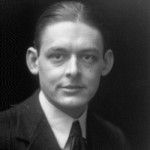Humankind cannot stand very much reality.
T. S. Eliot Quotes
As things are, and as fundamentally they must always be, poetry is not a career, but a mug's game. No honest poet can ever feel quite sure of the permanent value of what he has written: He may have wasted his time and messed up his life for nothing.
Similar Quotes
I thought narcissism meant you loved yourself. Then someone told me there is a flip si...
- Emily LevineMay your life preach more loudly than your lips.
- William Ellery ChanningThe fullness of life is in the hazards of life.
- Edith HamiltonBad reviews come with everything. I've been getting them my whole life.
- Will FriedleI would like my life to be a statement of love and compassion-and where it isn't, that's w...
- Ram DassComments on: "T. S. Eliot Quotes: As things are, and as fundamentally they must always be, poetry is not..."

| Birth: | 26th September, 1888 |
| Death: | 4th January, 1965 |
| Nationality: | American, British |
| Profession: | Critic, Dramatist, Editor, Playwriter, Poet, Publisher |
Eliot was born into the Eliot family, a middle class family originally from New England, who had moved to St. Louis, Missouri. From 1898 to 1905, Eliot attended Smith Academy, where his studies included Latin, Ancient Greek, French, and German. He began to write poetry when he was fourteen under the influence of Edward Fitzgerald's Rubaiyat of Omar Khayyam, a translation of the poetry of Omar Khayyam. He said the results were gloomy and despairing, and he destroyed them. His first poem published, "A Fable For Feasters," was written as a school exercise and was published in the Smith Academy Record in February 1905. Also published there in April 1905 was his oldest surviving poem in manuscript, an untitled lyric, later revised and reprinted as "Song" in The Harvard Advocate, Harvard University's student magazine. He also published three short stories in 1905, "Birds of Prey," "A Tale of a Whale" and "The Man Who Was King." The last mentioned story significantly reflects his exploration of Igorot Village while visiting the 1904 World's Fair of St. Louis.
After graduation, Eliot attended Milton Academy in Massachusetts for a preparatory year, where he met Scofield Thayer, who would later publish The Waste Land. He studied philosophy at Harvard from 1906 to 1909, earning his bachelor's degree after three years, instead of the usual four. Frank Kermode writes that the most important moment of Eliot's undergraduate career was in 1908, when he discovered Arthur Symons's The Symbolist Movement in Literature (1899). After working as a philosophy assistant at Harvard from 1909 to 1910, Eliot moved to Paris, where from 1910 to 1911, he studied philosophy at the Sorbonne. He attended lectures by Henri Bergson and read poetry with Alain-Fournier. From 1911 to 1914, he was back at Harvard studying Indian philosophy and Sanskrit. Eliot was awarded a scholarship to Merton College, Oxford in 1914. He first visited Marburg, Germany, where he planned to take a summer program, but when the First World War broke out, he went to Oxford instead.
Eliot died of emphysema in London on January 4, 1965. For many years he had had health problems caused by his heavy smoking, and had often been laid low with bronchitis or tachycardia.
Related Authors
Advertisement
Today's Anniversary - 16th November
Births
- 1839 - William De Morgan
- 1977 - Oksana Baiul
- 1946 - Dennis Kozlowski
- 1922 - Jose Saramago
- 1946 - Terence McKenna
Deaths
- 2006 - Milton Friedman
- 1894 - Robert Charles Winthrop
- 1695 - Pierre Nicole
- 1984 - Leonard Harry Rose
- 1603 - Pierre Charron
Quote of the day
Popular Topics
About Quoteswave
Our mission is to motivate, boost self confiedence and inspire people to Love life, live life and surf life with words.


Share with your friends